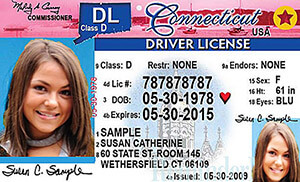- Updated for March 2025
- Based on official Connecticut Driver's manual
Free DMV Written Test Simulator for Connecticut | Updated for 2025
In Connecticut, regardless of your age, you must obtain a learner’s permit to practice supervised driving before you may take the road test for a driver’s license. To obtain a permit, you must be at least 16 years old, meet all the documentation requirements, pass a vision test, and pass the official written knowledge test on driving theory.
The Connecticut DMV written test has 25 multiple-choice questions based on the official Connecticut driver’s manual (Connecticut DMV Handbook (CT Driver's Manual) 2025). The test is offered in eleven languages, and you can specially request a hard copy of the test in one of 24 other languages. The passing score is 80%. You can take the vision and written tests only by appointment at certain DMV offices, not online. However, you must make the appointment online. If you’re under 18, your parent or guardian must come with you to the knowledge test or fill out a form to give their consent.
You must bring appropriate identification and pay a license examination fee to be allowed to take these tests. If you fail the vision test, you can make another appointment for it immediately. However, if you fail the knowledge test, you’ll have to wait seven days and pay another exam fee before you may retake it.
This is the second of our five Connecticut Permit Practice Tests. We designed all our permit practice tests to help aspiring drivers like you pass the DMV knowledge test on their first try. These practice tests are also multiple choice and based on the official Connecticut driver’s manual. Each practice test is up to date as of March 2025. Feel free to call on our AI Assistant for help with any practice question. If you get stuck on a question, you can ask the AI Assistant to discuss the question further, give you a hint, or answer your own questions about driving. If you still miss the question, you’ll be shown the correct answer and an explanation.
In addition to these practice tests, we have two PDF “cheat sheets” (i.e., quick references, not for actual cheating!) that you can download: “The Top 100 Most Common US DMV Questions” and “The 121 Most Common US Road Signs Questions.” Some of these questions are likely to be on your knowledge test. The correct answer is provided for each question listed.
Finally, we also offer our own Connecticut Permit Test Study Guide to help you get ready for the day of your Connecticut knowledge test. It covers what documents to take to the DMV, what fees you may have to pay, frequently missed knowledge test questions, and other last-minute tips.
- Perfect for learner’s permit, driver’s license, and Senior Refresher Test
- Triple-checked for accuracy
What you need to know

What to expect on the actual CT DMV exam
questions
correct answers to pass
passing score
minimum age to apply
List of questions (classic view)
- This road sign is a
- On a highway with three lanes in each direction, a vehicle towing a trailer keeps right because
- _________ mean(s) that passing is not allowed in either direction.
- Steam coming from underneath the hood of your vehicle may mean that
- Because of their size, trucks and buses may move _________ to make a right turn.
- When driving in rural areas, you must pay more attention to
- A solid white line between lanes of traffic means
- Work zone signs are usually
- Regulatory devices tell you
- Connecticut law requires you to leave at least ________ of space when passing a bicycle traveling in the same direction.
- When making a left turn at an intersection or into an alley or driveway, you must yield the right-of-way to
- The hand and arm extended downward indicate the driver's intention to
- If a railroad grade crossing has no warning devices or only a crossbuck sign, you should
- If you skid while hydroplaning, you should
- To recover from a skid, what should you do?
- To make a right turn from a four-lane divided highway, enter the right lane well in advance of the turn and make
- Before backing up, you should look to the front, sides, and rear, and continue to look _________ while backing.
- When entering or exiting a roundabout, you must
- Before changing lanes, you must check for traffic
- When you see a solid yellow centerline next to your lane, you must
- A double solid yellow line means
- When making a right turn, look right and left, yield the right-of-way, and turn the steering wheel using
- A double solid white line marks the edge of a traffic lane where
- A flashing yellow arrow means
- Which of these statements is FALSE?
- On a four-lane divided roadway or a one-way road, a solid yellow line usually marks
- An __________ is the connection of an expressway to a road or another expressway by a series of ramps.
- Signs with black letters on an orange background provide
- At an intersection whose traffic signals are NOT working, you should _________ before proceeding through the intersection.
- What does this sign mean?
- _________ are areas around trucks or other large vehicles in which other vehicles may disappear into blind spots.
- What does this sign mean?
- When entering an expressway from an acceleration lane, you must
- The letters "RR" painted on the pavement indicate that you are approaching
- You are in an intersection, turning left on a green arrow signal. Then the arrow signal turns yellow. What should you do?
- What does this sign mean?
- A barrier of grass, concrete, or other material separating opposing lanes on a divided highway is known as
- You should NOT sound your horn
- If an emergency vehicle with flashing lights or sounding a siren approaches you from either direction, you must
- What does this sign mean?
More resources
- Alabama: Test 1 / Test 2
- Alaska: Test 1 / Test 2
- Arizona: Test 1 / Test 2
- Arkansas: Test 1 / Test 2
- California: Test 1 / Test 2
- Colorado: Test 1 / Test 2
- Connecticut: Test 1 / Test 2
- Delaware: Test 1 / Test 2
- District of Columbia: Test 1 / Test 2
- Florida: Test 1 / Test 2
- Georgia: Test 1 / Test 2
- Hawaii: Test 1 / Test 2
- Idaho: Test 1 / Test 2
- Illinois: Test 1 / Test 2
- Indiana: Test 1 / Test 2
- Iowa: Test 1 / Test 2
- Kansas: Test 1 / Test 2
- Kentucky: Test 1 / Test 2
- Louisiana: Test 1 / Test 2
- Maine: Test 1 / Test 2
- Maryland: Test 1 / Test 2
- Massachusetts: Test 1 / Test 2
- Michigan: Test 1 / Test 2
- Minnesota: Test 1 / Test 2
- Mississippi: Test 1 / Test 2
- Missouri: Test 1 / Test 2
- Montana: Test 1 / Test 2
- Nebraska: Test 1 / Test 2
- Nevada: Test 1 / Test 2
- New Hampshire: Test 1 / Test 2
- New Jersey: Test 1 / Test 2
- New Mexico: Test 1 / Test 2
- New York: Test 1 / Test 2
- North Carolina: Test 1 / Test 2
- North Dakota: Test 1 / Test 2
- Ohio: Test 1 / Test 2
- Oklahoma: Test 1 / Test 2
- Oregon: Test 1 / Test 2
- Pennsylvania: Test 1 / Test 2
- Rhode Island: Test 1 / Test 2
- South Carolina: Test 1 / Test 2
- South Dakota: Test 1 / Test 2
- Tennessee: Test 1 / Test 2
- Texas: Test 1 / Test 2
- Utah: Test 1 / Test 2
- Vermont: Test 1 / Test 2
- Virginia: Test 1 / Test 2
- Washington: Test 1 / Test 2
- West Virginia: Test 1 / Test 2
- Wisconsin: Test 1 / Test 2
- Wyoming: Test 1 / Test 2
Your go-to, trusted source
Experience the Driving-Tests differenceOur commitment to accuracy and quality in our practice tests
Explore our rigorous, multi-tiered verification process that ensures each question mirrors the official manual for unparalleled accuracy.

At Driving-Tests.org, we understand the importance of reliable and accurate practice tests to help you prepare for your DMV exam. That's why we've developed a meticulous process to create and continually update our practice questions, ensuring they reflect the most current driving laws and regulations.
Here's an inside look at how we maintain the highest quality in our practice tests.
Content Creation and Verification Process
- Alignment with Official Manuals:
Every question we develop is based on the most recent version of each state's official driving manual. Our team regularly monitors each state DMV's website for the latest updates to ensure our practice tests are always aligned with the most current information. - Community Feedback Integration:
We leverage feedback from our vast community of users to understand which topics are most frequently tested. This helps us focus on the areas that are most relevant and beneficial for your preparation. - Expert Content Creation:
Our in-house editor, Steven, who has extensive experience in driver education, crafts each question with precision. He conducts a thorough review of each question against the official manuals to ensure accuracy. - Rigorous Review Process:
Once Steven has finalized a set of questions, our team conducts a joint review session. This second level of scrutiny involves content accuracy, proofreading, and fact-checking to eliminate any errors. - User Feedback Mechanism:
After a question goes live on our site, we keep the lines of communication open. Each question features a feedback button, inviting users to report any issues or errors. This continuous feedback loop allows us to address and rectify any concerns promptly. - Responsive Updates:
In line with our commitment to accuracy, we quickly update our practice questions to reflect any changes in the DMV manuals. Additionally, we update the free electronic copy of the state's driver's license manuals on our site, typically within a few days after the DMV publishes them.
Our thorough quality control process ensures that you have access to practice tests that are as accurate and up-to-date as possible. We believe in the power of well-prepared drivers and are dedicated to providing you with the best study tools to help you succeed on your DMV exam.
Pass the First Time - Guaranteed
Before you view your test results, discover how you can pass faster with Premium:
Real Exam-Like Connecticut Questions
Get 650+ questions seen on the real test
Money-Back Guarantee
If you don't pass, it costs you nothing
97% Premium Users Pass on Their First Try
Compare with the average US passing rate of 49%
